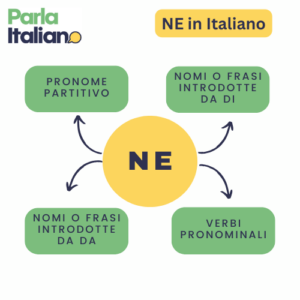Some of the most difficult verbs to learn are the pronominal verbs (verbi pronominali). Despite this, these are very commonly used in everyday life, so it is important that you become familiar with them.
These are the eight most common pronominal verbs used in Italian:
- Volerci
- Cascarci
- Rimetterci
- Andarsene
- Fregarsene
- Smetterla
- Cavarsela
- Sentirsela
But, before we analyse each one individually, let’s answer the question: why are pronominal verbs difficult and how can I learn these easily?
What are pronominal verbs in Italian?
These verbs are the category of verbs called ‘verbi pronominali’. They are made up of a basic verb which is used together with one or more pronouns. A pronominal verb has a different meaning than the basic verb. The conjugation of each pronominal verb follows a special pattern.
If you are not yet familiar with the basic conjugation of verbs, then before you tackle the pronominal verbs, familiarise yourself with these. You can find a simple yet comprehensive guide here. If you are already familiar with the basic verbs, then carry on.
Metterci
Here is a pronominal verb use as an example: metterci. The basic verb is mettere (to put, to place), however, used with the pronoun ci, the meaning of the verb changes completely. The meaning of metterci is related to the time required to do something by someone/something. For example: It takes me ten minutes to do it = ci metto dieci minuti a farlo.
How commonly used are pronominal verbs in Italian?
These verbs are very common and are widely used especially in conversational Italian. For example, these expressions are all translated with a pronominal verb:
- Hurry up: sbrigati (sbrigarsi) See also my post on instagram here.
- Stop it: smettila (smetterla)
- You can do it: ce la fai (farcela)
- I don’t care: me ne frego (fregarsene)
Why are they difficult to learn?
Pronominal verbs are not always easily translated, and they require many examples in context in order to calibrate their exact meaning. This is because their meaning might be covered by one translation in one context but not in another. But don’t worry, we’ll explain each one and give you examples.
How to conjugate pronominal verbs
In order to conjugate these verbs, you need to learn their pattern. Let’s go back to our previous example: metterci.
The conjugation of the present tense is as follows:
Presente indicativo
Io ci metto
Tu ci metti
Lei/lui ci mette
Noi ci mettiamo
Voi ci mettete
Loro ci mettono
As you can see nothing too scary here, the basic verb does not change just add the pronoun ci before it and that is it.
Here is the conjugation of the past tense passato prossimo:
Passato prossimo
Io ci ho messo
Tu ci hai messo
Lei/lui ci ha messo
Noi ci abbiamo messo
Voi ci avete messo
Loro ci hanno messo
In some cases, like this one, the pronoun does not change. In others, however, it does so it is important that you study each pronominal verb as it follows its own pattern.
Today we will introduce the eight most used pronominal verbs. We will delve into their meaning first, the register, in other words the situation in which these words are used, and then we’ll show you how to conjugate them.
The eight most used pronominal verbs in Italian
This is our list of verbs, which ones do you know already?
- Volerci
- Cascarci
- Rimetterci
- Andarsene
- Fregarsene
- Smetterla
- Cavarsela
- Sentirsela
1. Volerci
This verb has a similar meaning to metterci. However, if metterci is related to the time required to do something by someone/something, volerci is related to the time required by something to be done. For example: It takes ten minutes to do it = ci vogliono dieci minuti per farlo.
Here are more examples:
- Quanto tempo ci vuole per fare la pizza? Ci vuole mezz’ora.
How long does it take to make pizza? It takes half an hour.
- Ci vuole un’ora per andare a Milano.
It takes an hour to go to Milan.
- Per fare i miei compiti ci vogliono tre ore.
It takes three hours to do my homework.
- Ci è voluta una giornata per salire in montagna.
It took a day to get up the mountain.
Register
In terms of register (in other words: the way the speaker uses language differently in different circumstances) this verb is used in all situations and contexts.
Note that this verb is only used in the third person singular and the third person plural.
Here is the conjugation:
Presente Passato prossimo
Ci vuole Ci è voluto/a
Ci vogliono Ci sono voluti/e
2. Cascarci
The pronominal verb cascarci means to be taken in, to fall for, or to rise to the bait. It can also mean to be swindled.
Here are examples:
- Ha giocato a carte con dei truffatori, gli hanno fatto credere di essere bravo. Lui ci è cascato e ha perso migliaia di soldi.
He played with some swindlers, they made him think that he was good, he fell for it and lost thousands of pounds.
- Gli abbiamo fatto uno scherzo e ci è cascato.
We did a practical joke on him, and he fell for it.
- Ha detto una bugia e ci sei cascato.
She told you a lie and you have believed her.
Register
In terms of register, this verb is used in all informal contexts.
Here is the conjugation:
Presente Passato prossimo
Io ci casco Io ci sono cascato
Tu ci caschi Tu ci sei cascato
Lui/lei ci casca Lui ci è cascato/lei ci è cascata
Noi ci caschiamo Noi ci siamo cascati
Voi ci cascate Voi ci siete cascati
Loro ci cascano Loro ci sono cascati
Notice that this verb follows the same pattern as metterci, it uses the same pronouns and so the same structure.
3. Rimetterci
This verb means to loose something, to loose out on something. It can also mean to ruin something.
It can also mean to be in shape to do something not necessarily difficult, but which requires some energy. In this case, it means to feel like doing something.
Here are examples:
- Ho fatto degli investimenti sbagliati e ci ho rimesso tutti i miei risparmi.
I have made some bad investments and lost all my savings.
- Ha gridato così tanto che ci ha rimesso la voce.
He screamed so much he lost his voice - Nevicava e ci ho rimesso le scarpe nuove.
It was snowing and I have ruined my new shoes.
- Ho fumato tutta la vita e ci ho rimesso la salute.
I have smoked all my life and ruined my health.
Register
In terms of register, this verb is used in all contexts forma and informal.
Here is the conjugation:
Presente Passato prossimo
Io ci rimetto Io ci ho rimesso
Tu ci rimetti Tu ci hai rimesso
Lui/lei ci rimette Lui/lei ci ha rimesso
Noi ci rimettiamo Noi ci abbiamo rimesso
Voi ci rimettete Voi ci avete rimesso
Loro ci rimettono Loro ci hanno rimesso
Notice that this verb follows the same pattern as the previous as it uses the same pronouns and so the same structure.
4. Andarsene
Andarsene means to go away, to leave, to go somewhere else and this is usually done in order to leave a difficult or unpleasant situation.
Here are examples:
- I miei genitori erano soffocanti così me ne sono andato di casa.
My parents were oppressive so I moved out.
- La festa era noiosa e alle 10.00 me ne sono andata.
The party was boring so I left at 10pm.
- Vivere in campagna non mi piaceva così me ne sono andato in città.
I didn’t like country living so I left for the city.
Register
In terms of register, this verb is used in informal Italian.
Here is the conjugation:
Presente Passato prossimo
Io me ne vado Io me ne sono andato
Tu te ne vai Tu te ne sei andato
Lui/lei se ne va Lui se n’è andato/lei se n’è andata
Noi ce ne andiamo Noi ce ne siamo andati
Voi ve ne andate Voi ve ne siete andati
Loro se ne vanno Loro se ne sono andati
In this particular case, notice that we have two pronouns used for this verb, ne does not change while the first pronoun is the reflexive pronoun which combined with ne takes the form ending with an e.
In the past tense remember to agree the past participle as you normally do when using the verb essere.
5. Fregarsene
This pronominal verb means not to care in the least, not giving a monkey’s, to be so not bothered, not to care about someone or something.
Here are examples:
- Me ne frego dei politici, sono tutti falsi.
I don’t care about politicians they are all false.
- Me ne frego delle regole, voglio essere libero.
I don’t care about the rules, I want to be free.
- Il calcio non m’interessa, me ne frego della tua partita importante
I’m not interested in football, I don’t give a monkey’s about your important game.
Register
In terms of register, this verb is widely used in informal, colloquial Italian, so use this with your friends and family, or people you know well.
Here is the conjugation:
Presente Passato prossimo
Io me ne frego Io me ne sono fregato
Tu te ne freghi Tu te ne sei fregato
Lui/lei se ne frega Lui se n’è fregato /lei se n’è fregata
Noi ce ne freghiamo Noi ce ne siamo fregati
Voi ve ne fregate Voi ve ne siete fregati
Loro se ne vanno Loro se ne sono fregati
Notice that this verb includes the same pronouns as the previous ones and follows the same pattern. So, learn these together.
6. Smetterla
Smetterla means to stop doing something, usually something annoying.
It is very common to hear ‘smettila’ which means ‘stop it’.
Here are more examples:
- I bambini facevano troppo rumore ma l’hanno smessa quando è arrivata l’insegnante.
The children were making a lot of noise, but they stopped it when the teacher arrived.
- Mi stai dando fastidio, smettila.
You are annoying me, stop it.
- Mi ripeti sempre la stessa cosa, smettila.
You are telling me the same thing over and over, stop it.
Register
In terms of register, this verb is used in spoken, colloquial Italian.
Here is the conjugation:
Presente Passato prossimo
Io la smetto Io l’ho smessa
Tu la smetti Tu l’hai smessa
Lui/lei la smette Lui/lei l’ha smessa
Noi la smettiamo Noi l’abbiamo smessa
Voi la smettete Voi l’avete smessa
Loro la smettono Loro l’hanno smessa
Notice that the pronoun la does not change. Furthermore, it affects the verb in the past tense following the rule of the passato prossimo preceded by the pronoun. When there is an object pronoun before the verb the past participle is accorded with it.
7. Cavarsela
This pronominal verb has at least three different meanings:
- It means to manage to overcome a difficult or dangerous situation.
To scrape through a situation. So, to just manage to overcome it.
- It can also mean to get away with it by using ones own astuteness or intelligence or by luck.
- It can also mean to have a good ability with something.
Here are examples:
Meaning 1:
- L’esame era molto difficile, ma me la sono cavata e l’ho passato.
The exam was very difficult, but I managed to pass.
- Non ho studiato ma me la sono cavata per miracolo.
I hadn’t studied but I managed to scrape through, passing the test.
Meaning 2:
- I carabinieri mi hanno fermato per eccesso di velocità ma essendo simpatico, me la sono cavata solo con un rimprovero.
The police stopped me for speeding, however, I used my charm and got away only with a reprimand.
- Ho avuto un brutto incidente, ma la macchina era molto solida e me la sono cavata senza ferite.
I was in a terrible car accident, fortunately the car was really solid, and I got away with it, I wasn’t even injured.
Meaning 3:
- Me la cavo bene con l’italiano, l’ho studiato per cinque anni.
My Italian is good, I have been studying for five years.
- Me la cavo bene con il tennis, è la mia passione.
I’m quite good at tennis, it’s my passion in life.
Register
In terms of register, this verb is used widely in informal Italian.
Here is the conjugation:
Presente Passato prossimo
Io me la cavo Io me la sono cavata
Tu te la cavi Tu te la sei cavata
Lui/lei se la cava Lui se l’è cavata /lei se l’è cavata
Noi ce la caviamo Noi ce la siamo cavata
Voi ve la cavate Voi ve la siete cavata
Loro se la cavano Loro se la sono cavata
Notice that this verb also includes two pronouns, the first is the reflexive pronoun and the second the direct pronoun la which does not change throughout and affects the past participle which has to end
in -a.
8. Sentirsela
Sentirsela means to have the strength, courage, energy (or skill) to do something which is perceived as difficult or taxing, burdensome. It means to feel up to.
It can also mean to be in shape to do something not necessarily difficult, but which requires some energy. In this case, it means to feel like doing something.
Here are examples:
Meaning 1:
- Hai una gamba rotta, te le senti di uscire?
You have a broken leg, do you feel up to going out?
- Il marito era così sconvolto che non se l’è sentita di andare al funerale della moglie
The husband was so distraught that he couldn’t go to her wife’s funeral.
- Oggi nevica, te la senti di uscire con la macchina?
Today it is snowing, do you feel up to going out with the car?
Meaning 2:
- Hai lavorato duramente per tutto il giorno, te la senti di andare a ballare?
You’ve worked hard all day, do you feel like going dancing?
Register
In terms of register, this verb is used in all contexts.
Here is the conjugation:
Presente Passato prossimo
Io me la sento Io me la sono sentita
Tu te la senti Tu te la sei sentita
Lui/lei se la sente Lui se l’è sentita /lei se l’è sentita
Noi ce la sentiamo Noi ce la siamo sentita
Voi ve la sentite Voi ve la siete sentita
Loro se la sentono Loro se la sono sentita
Notice that this verb follows the same pattern as the previous as it uses the same pronouns and so the same structure.
Is there a verb that you have difficulties with? Let us know and we’ll write a blog post to explain it.







